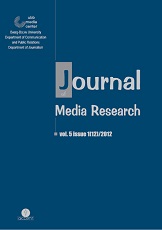Social Comparison with Groups Portrayed in Online News
Social Comparison with Groups Portrayed in Online News
Author(s): Zoltán Ambrus, Csilla Zsigmond, István KósaSubject(s): Social Sciences
Published by: Accent Publisher
Keywords: social comparison; selective exposure to online news; high perceived control; groups living in very bad or very good social condition
Summary/Abstract: The current investigation1 differs from earlier researches in at least two points. It aims to test the effects of selective exposure to headlines depicting groups on the internet users. In formulating news, our investigation takes into account Lockwood’s finding (2000), that people make more often use of downward social comparison when they cannot imagine to get into a situation like their selection target. Participants (N = 161) of a single age group were exposed to selective exposure to manipulated online headlines focused on groups living in poverty or luxury. Results indicate that the level of self-esteem did not influence the direction of social comparisons. Selective exposure to news by gender shows that while women chose significantly frequent news on worse-off others, men preferred negatively valenced ones on groups living in luxury. Downward comparison is most significant when both the news depicting groups in poverty and news on groups living in luxury are positive. Contrary to our hypothesis based on Wheeler and Miyake’s findings (1992), participants in a bad mood favoured mostly (weak tendency) downward comparison, meanwhile those in good mood preferred news about better-off others to news about worse-off others significantly frequent.
Journal: Journal of Media Research - Revista de Studii Media
- Issue Year: 5/2012
- Issue No: 12
- Page Range: 27-44
- Page Count: 17
- Language: English
- Content File-PDF

